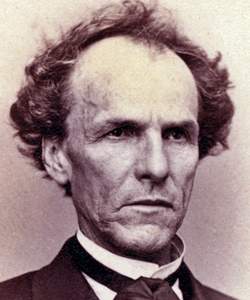James Henry Lane (Congressional Biographical Directory)
Reference
LANE, James Henry, (son of Amos Lane), a Representative from Indiana and a Senator from Kansas; born in Lawrenceburg, Ind., June 22, 1814; attended the public schools; studied law; admitted to the bar in 1840 and commenced practice in Lawrenceburg; member of the city council; served in the Mexican War; lieutenant governor of Indiana 1849-1853; elected as a Democrat to the Thirty-third Congress (March 4, 1853-March 3, 1855); moved to the Territory of Kansas in 1855; member of the Topeka constitutional convention 1855; elected to the United States Senate by the legislature that convened under the Topeka constitution in 1856, but the election was not recognized by the United States Senate; president of the Leavenworth constitutional convention in 1857; elected as a Republican to the United States Senate in 1861; reelected in 1865 and served from April 4, 1861, until his death; chairman, Committee on Agriculture (Thirty-eighth Congress); appointed by President Abraham Lincoln brigadier general of volunteers and saw battle during the Civil War; deranged and charged with financial irregularities, Lane shot himself on July 1, 1866, but lingered ten days, dying on July 11, near Fort Leavenworth, Kans.; interment in the City Cemetery, Lawrence, Kans.
"Lane, James Henry," Biographical Directory of the United States Congress, 1774 to Present, http://bioguide.congress.gov/scripts/biodisplay.pl?index=L000061.
James Henry Lane (American National Biography)
Scholarship
When he arrived in Washington to present a memorial to Congress for admission of Kansas as a free state, [James] Lane was rebuffed by [Senator Stephen] Douglas and other Democrats. Lane responded by conducting a speaking tour in Ohio, Indiana, and Illinois on behalf of the Free State movement. Albert Richardson, a contemporary, wrote that Lane's oratory could make "men roar with laughter, or melt into tears, or clench their teeth in passion." During the tour the nation was polarized by reports of violence in "Bleeding Kansas." On 31 May 1856, in Chicago, Lane addressed ten thousand antislavery partisans, who subscribed thousands of dollars toward financing Free State immigration, settlement, and defense. He routed immigrants, arms, and ammunition along the "Lane Trail," which crossed Iowa, thus evading hostile Missourians. Back in Kansas, Lane and his "jayhawking" Free State armed parties terrorized proslavery settlements.
Lane's break with Douglas and the Democratic party was complete when he advocated "Free Territory and Frémont [John C. Frémont]," in the presidential election of 1856. In 1857 Free State adherents boycotted an election of delegates to a constitutional convention at Lecompton, and proslavery forces won a large majority. At Lane's urging, however, the Free State proponents participated in the election for territorial legislators and won. The new legislators commissioned Lane as a major general of militia and ordered a referendum on the proslavery Lecompton constitution, which was rejected.
Lane's break with Douglas and the Democratic party was complete when he advocated "Free Territory and Frémont [John C. Frémont]," in the presidential election of 1856. In 1857 Free State adherents boycotted an election of delegates to a constitutional convention at Lecompton, and proslavery forces won a large majority. At Lane's urging, however, the Free State proponents participated in the election for territorial legislators and won. The new legislators commissioned Lane as a major general of militia and ordered a referendum on the proslavery Lecompton constitution, which was rejected.
Mark A. Plummer, "Lane, James Henry," American National Biography Online, February 2000, http://www.anb.org/articles/04/04-00612.html.



